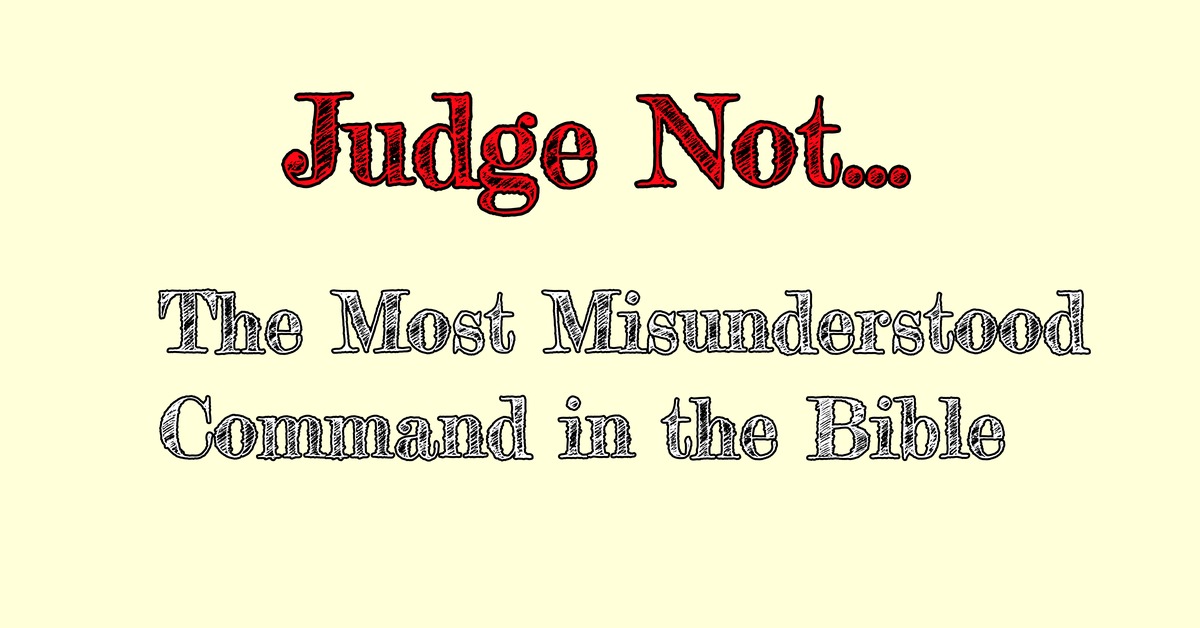“Judge not, that you be not judged. For with the judgment you pronounce you will be judged, and with the measure you use it will be measured to you. Why do you see the speck that is in your brother’s eye, but do not notice the log that is in your own eye? Or how can you say to your brother, ‘Let me take the speck out of your eye,’ when there is the log in your own eye? You hypocrite, first take the log out of your own eye, and then you will see clearly to take the speck out of your brother’s eye.
“Do not give dogs what is holy, and do not throw your pearls before pigs, lest they trample them underfoot and turn to attack you.
Understanding And Applying the Text
Judge not that you be not judged. This is a phrase from the bible every sinner knows. Whenever someone needs correction. This is the retore, “judge not.” But they rip it out of context. They remove the context not only of the immediate passage of the whole of scripture.
We are to be as wise as serpents and innocent as doves (Matthew 16:31). This requires judging. Jesus is not prohibiting identifying and condemning sin. Paul is harsh when he corrects both the Corinthians and Galatians. He recognized their sin and told them to stop. To allow someone to continue in sin is not loving. It is not kind. It is apathy and unloving.
To claim we are not to discern between good and evil is ridiculous. A prohibition against judging between good and evil contradicts the whole of scripture. In fact, the end of this passage requires judging. “Do not give dogs what is holy” You have to discern what is holy and what is not. And who are the dogs?
Christ is prohibiting hypocrisy. We love condemning others for the faults we have. Everyone enjoys learning about other people’s failings. And everyone agrees it is wrong to overlook our own faults while condemning them in others. Yet we do it.
Because everyone does it, does not justify it. It does not even make it a lesser sin. For all have sinned and fallen short of the glory of God. (Roman 3: 23) God sets the standard. Because something is normative does not mean it is right, good, or even benign.
Believers are to recognize evil. But we are to restrain ourselves from judging and condemning.
We judge those who teach righteousness the most. We expect perfection from them. We condemn trivial faults as if they were hideous crimes. James mentions this (James 3:1-12) We hold teachers to a higher standard. Knowing what is right and being able to hold that standard are two different things. Teaching what is right and condemning what is wrong is not judging. It is teaching. An addition error does not disqualify someone from teaching mathematics.
We are not permitted to condemn sinners. That is God’s job. It is not ours. And let me point out the obvious. You and I are not God. We are bound to condemn sin. But we are to inform our judgment with charity and love.
God is the only Lawgiver and Judge. (Isaiah 33:22) Christ condemns those who assume God’s rightful place and act as judges. They will only receive the charity they give.
We recognize faults in others. But we fail to see our own. We are blind to our faults. But other’s faults we see with clarity. And we complain about them. We gossip about them. And those very faults we own in a larger measure.
As I mentioned Christ was not proclaiming a lack of discernment. We are not to take that which is holy and give it to dogs. We are not to take that which has value and give it to pigs. They will not recognize its value. Instead, they will destroy it and attack you.
But what about the last verse of the passage. How does it tie into the rest of the passage and sermon? Is it a separate statement detached from the rest of the sermon? John Calvin understood this to be a detached verse, a separate bullet point in the sermon. Dogs and pigs are names given to those who have no fear of God. In another passage, Christ compares dogs with the elect. “It is not right to take the children’s bread and throw it to the dogs.” (Matthew 15:26)
If that is the case it raises a question. Aren’t we to preach the Gospel to all men? (Mark 15:15; Matthew 28:19-20)
It is a mistake not to tie it to what came before. Christ is saying it is of no value to correct the reprobate. They will not receive it. They will take that which is holy and twist it and turn it into an attack against you. They will not receive correction.
Rather than correction, we are to preach the law and the Gospel to men. For the law condemns but the Gospel brings hope.

Leave a Reply